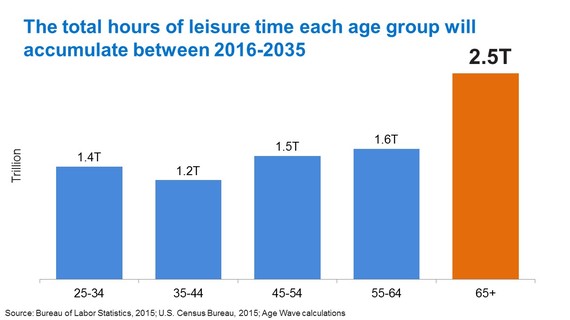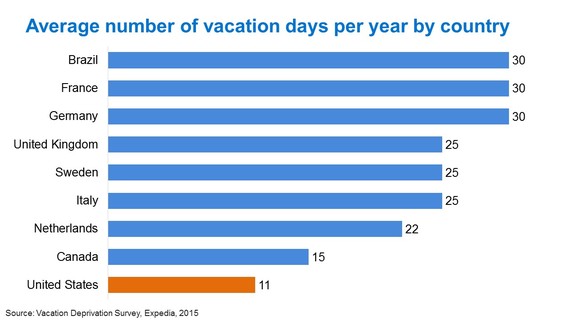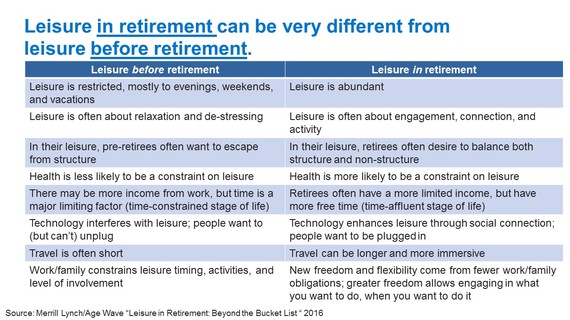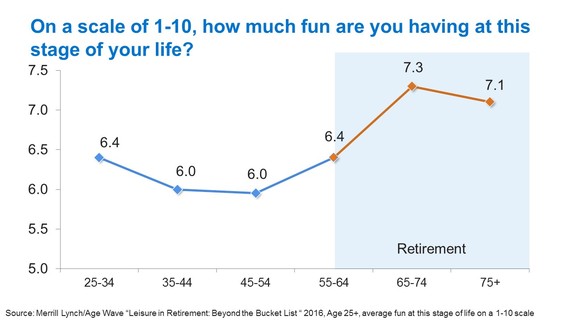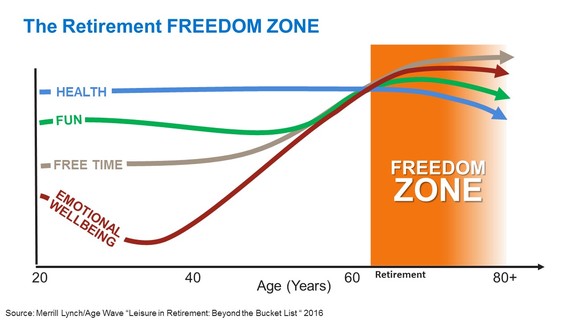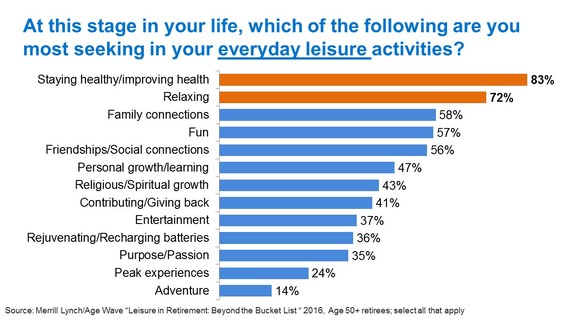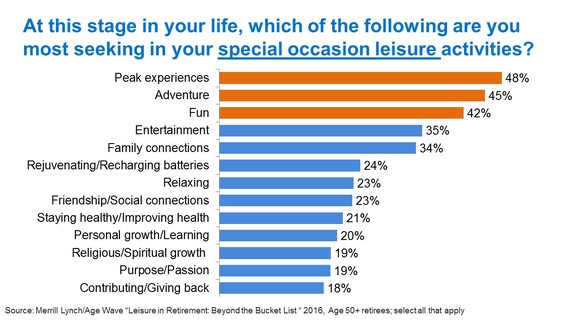Part One of a Two-Part Series
With nearly 10,000 boomers retiring each day, a profoundly different portrait of retirement leisure is beginning to emerge -- which many retirees tell us is the most liberating and enjoyable time of their lives. And, as I'll explain, money doesn't seem to be the primary key to enjoying leisure in retirement.
My firm, Age Wave, recently partnered with Bank of America Merrill Lynch on a landmark research study, "Leisure in Retirement: Beyond the Bucket List", to deeply explore the depth and breadth of the new model of leisure that is emerging. We surveyed a representative sample of 3,712 adults age 25+ from all socio-economic backgrounds and walks of life with the goal of creating a multi-dimensional portrait of leisure in retirement. Some of the results may surprise you. You can download the full report here: www.ml.com/retirementstudy
From "Time Constrained" to "Time Affluent"
Retirees have one thing head-and-shoulders above the rest of us: free time. Lots more free time. Collectively, retirees will enjoy 126 billion -- yes, BILLION -- hours of leisure time this year alone. And as tens of millions of boomers move from being "time constrained" to "time affluent" over the next 20 years, they will collectively amass 2.5 trillion hours of leisure time (FIG 1).
FIG 1
Learning how to shift out of a high-pressure, time-constrained, workaholic lifestyle is one of the great challenges and opportunities of our newfound longevity. In fact, with longer lifespans and the rejection of yesterday's model of old age, leisure in retirement has evolved into far more than "winding down." It has become an extended period of new freedoms and flexibility truly unlike any other time in life. As one focus group participant told us, "Suddenly what you want to do trumps what you have to do. It's exhilarating to have this kind of freedom."
The "No-Vacation Nation"
In order to fully appreciate the freedom of retirement leisure, people have to break their addiction to work, which can be a hard thing to do. Let's take a quick look at where we're coming from. Americans often define ourselves by how hard we work, our job title, or our career path. For many of us, workaholism has become a way of life. In fact, compared to other industrialized countries, Americans are the most vacation deprived (FIG 2).
FIG 2
We have, on average, the fewest paid vacation days of any developed nation, and 41 percent of employed Americans don't even use all of their vacation time. Like it or not, we have become a no vacation nation.
Even when we do take vacations, we still work! While boomers are definitely a workaholic generation, with 76 percent saying they work while on vacation, younger generations report having an even harder time tuning out, with a whopping 81 percent of generation Xers and 89 percent of millennials telling us they work while on vacation.
As you can see in the chart below, when we transition from the time-constrained pressures of workaholic lives to the time affluence of retirement, our approach to leisure changes dramatically (FIG 3). Seventy-nine percent of today's retirees report that they finally have the amount of free time they desire. And when we asked what they thought the ideal length of retirement should be, "20 years" was the average answer.
Surprise! Freedom, Fun, and Emotional Wellbeing Soar in Life Beyond Work
When we move into retirement, our identity is less defined by what we have to do, and more by the leisure activities and interests we choose to pursue. Rather than having to punch a clock, please a boss, impress your parents or your kids (or both!) or meet a deadline, people find that they can now do a lot more of what they want to do, when they want to do it, and often on their own terms. The transition can be exhilarating. As one focus group participant explained, "Before retirement, I defined myself almost completely by my work. Now, I define myself by what I do with my leisure -- I'm now a grandmother, a French student, a cook, and a volunteer. I'm becoming who I want to be. It's a feeling of liberation!"
Our study also revealed that despite how it's portrayed by popular media, fun is not primarily the domain of youth. In fact, for most people, fun actually rises in midlife and peaks in retirement (FIG 4). This is due to LESS stress, obligation, and pressure from work and MORE freedom to engage in leisure activities retirees genuinely enjoy.
FIG 4
Perhaps even more interesting, our study showed that money isn't the key to happiness in retirement. In fact, as you'll see in the next chart, retirees at all financial levels really enjoy their leisure time and feel that retirement gives them greater freedom to do what they want (FIG 5). It seems that with the currency of "discretionary time," people generally pursue the kind of leisure they can afford -- and are willing to make adjustments to have a good time. For example, one focus group participant said, "I always wanted to play the great golf courses of Europe. But now I realize if I can play the great courses of Northern New Jersey, that would be just fine."
FIG 5
What about other measures of emotional wellbeing? Contrary to cultural stereotypes that portray youth as the height of psycho-social vitality and maturity as a period of emotional decline, our study revealed that emotional wellbeing actually peaks in retirement. Feelings of happiness, contentment, and relaxation soar, while anxiety seems to plummet. As Andy Sieg, head of Global Wealth and Retirement Solutions for Bank of America Merrill Lynch, points out "Given the opportunities that come with more leisure time to be enjoyed in new and different ways, America is heading toward a happiness dividend." We've labeled this the Retirement Freedom Zone (FIG 6).
FIG 6
Ninety-five percent of retirees tell us they greatly prefer having enjoyable experiences over buying more things. One focus group participant summed it up nicely: "When I was younger, I was focused on having a nice house and a great car. Now that I'm older, I realize it's all about the experiences in life -- not the things -- that matter most." Retirees also place a premium on their relationships, telling us who they spend time with is far more important than what they do.
Our study taught us that there are two general types of retirement leisure -- each with its own set of priorities and preferred activities. In "everyday leisure" (FIG 7), most retirees want to de-stress and improve their health. In "special occasion leisure" such as travel (FIG 8), peak experiences, adventure, and fun top the list. While only 15 percent of retirees related to the idea of a "bucket list" of things to do before you die, more than 80 percent say they want to fill their retirement with "peak experiences," moments that are unique or rare and stand out from commonplace events and give them special lifetime memories.
FIG 7
As you make financial preparations for your own retirement, remember to save not just for the expenses of daily living, but to envision and plan for what you want to do with this new chapter of your life. How will you use your leisure to redefine your relationships with your family, your friends, and yourself? What's the thing you most want to do that you've never had the time and freedom to try?
Leisure -- and the feeling of freedom -- is the part of retirement that people look most forward to. Pre-retirees dream about the new adventures they will have, the trips they will go on with their children and grandchildren, the new hobbies they will start. Yet it is one of the least planned for aspects of retirement.
So, notwithstanding all of the potent upsides to retirement leisure, we all could probably be doing a better job of envisioning and planning for how we're going to fund our dreams for the years ahead.
Stay tuned for part two of this series, posting tomorrow. I'll describe the four distinct stages of retirement leisure that were uncovered in our study, and what makes each one tick.
Earlier on Huff/Post50:

